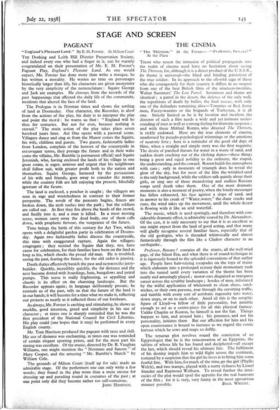STAGE AND SCREEN
PAGEANT
"England's Pleasant Land." By E. M. Forster. At Milton Court
THE Dorking and Leith Hill District Preservation Society,
and indeed every one who had a finger in it, can be warmly congratulated on their presentation of Mr. E. M. Forster's Pageant Play, England's Pleasant 'Land. As one would expect, Mr. Forster has done more than write a masque, he has written a morality. He wastes no time on personages historically larger than life, his characters are given anonymity by the very simplicity of the nomenclature : Squire George and Jack are examples. He chooses from the records of the past happenings that affected the daily life of the community, incidents that altered the face of the land.
The Prologue is in Norman times and shows the settling of land at Doomsday. One character, the Recorder, is aloof from the actions of the play, his duty is to interpret the play and point the moral : he warns us that : " England will be thus for centuries. But not for ever, because nothing is eternal." The main action of the play takes place seven hundred years later. Act One opens with a pastoral scene. Villagers dance and sing as from the Manor comes the _Squire, his wife, children and guests. Two guests, fashionable ladies from London, complain of the horrors of the countryside in extravagant terms, they presage the future and in their wake come the villains, Mr. Bumble (a permanent official) and Squire Jeremiah, who, having enclosed the lands of his village in one great estate, is eager, anxious and urgent that his neighbours shall follow suit, with greater profit both to the nation and themselves. Squire George, harassed by the persuasions of his wife and friends, goes away to consider the matter, while the country folk are left enjoying the present, blissfully ignorant of the future.
The land is enclosed, a poacher is caught ; the villagers are seen in rags and wretchedness in contrast to their former prosperity. The revolt of the peasants begins, fences are broken down, the mob rushes into the park ; but the soldiers are called out. At first they fire above the heads of the crowd, and finally into it, and a man is killed. In a most moving scene, women carry away the dead body, one of them calls down, with prophetic fervour, the vengeance of the future.
Time brings the birth of this century for Act Two, which opens with a delightful garden party in celebration of Dooms- day. Again two fashionable ladies discuss the countryside, this time with exaggerated rapture. Again the villagers congregate ; they remind the Squire that they, too, have cause for celebration, for their families have been on the land as long as his, which shocks the proud old man. He is troubled, seeing the past, fearing the future, for the old order is passing.
Death duties effectively banish the past and summon the jerry- builder. Quickly, incredibly quickly, the far distance and the near become dotted with hoardings, huts, bungalows and petrol pumps. This scene is really frightening, so appalling and chaotic is its effect on the charming landscape. But the Recorder appears again; in language deliberately prosaic, he reminds us of the past, tells us that the future of the land is in our hands; it will become for a time what we make it, reflecting our projects as nearly as it reflected those of our forebears.
As always, Mr. Forster is exciting and stimulating, he shows us muddle, good intention, greed and simplicity in his use of character ; at times one is sharply reminded that he was the first president of the National Council for Civil Liberties. His play could (one hopes that it may) be performed in every English county.
Mr. Tom Harrison produced the pageant with taste and skill. His use of distance was enchanting, at times one was reminded of certain elegant sporting prints, and for the most part his timing was excellent. Of the music, directed by Dr. R. Vaughan Williams, one might mention the " Normans and Saxons " of Mary Cooper, and the amusing " Mr. Bumble's March " by William Cole.
The grounds of Milton Court (itself up for sale) made an admirable stage. Of the performers one can only write a few words; they found in the play more than a mere excuse for dressing up and parading round in costumes of the past ; at one point only did they become rather too self-conscious.
JOHN HAMPSON.











































 Previous page
Previous page